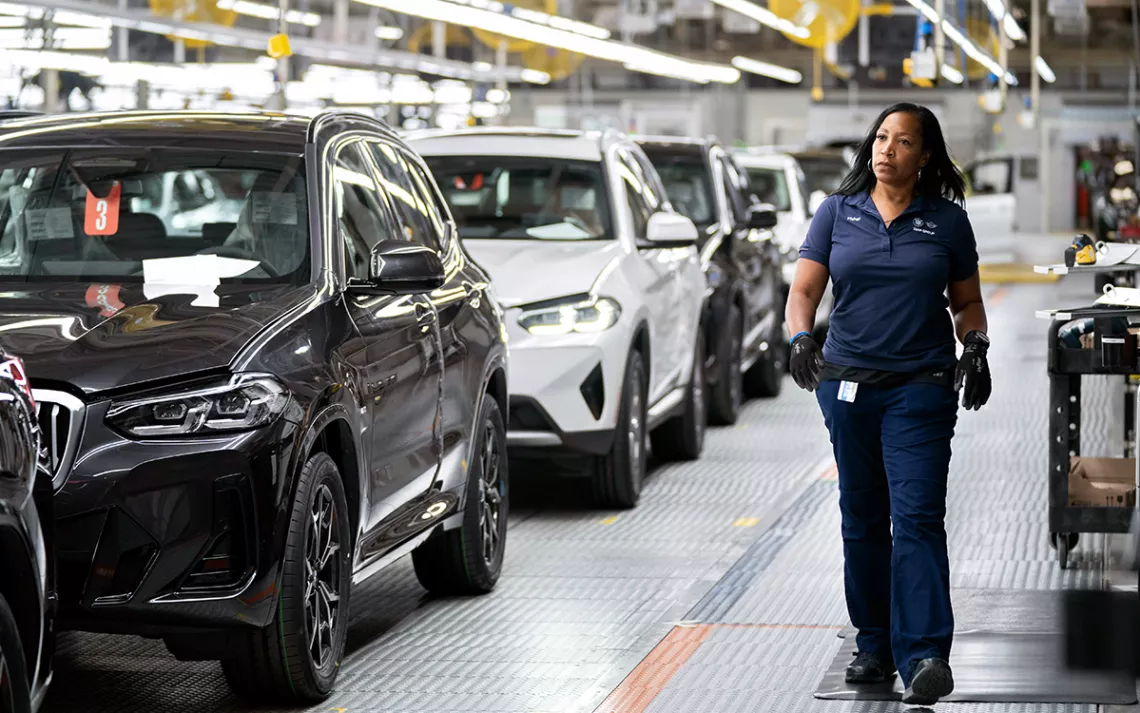The Inflation Reduction Act Is Driving a Renewed Pivot to Green Energy
Here's how the climate bill is stoking manufacturers to go renewable

Photo by Sean Rayford/AP Photo
It was an announcement so big that Senator Lindsey Graham was there to celebrate. Big dollars—some $1.7 billion—were coming to his home state of South Carolina, courtesy of German automaker BMW. And that meant jobs—though for a sector of the auto industry that the Republican lawmaker is not in the habit of celebrating. BMW was investing the money to transition its Greer facility from manufacturing gas vehicles to electric, with $700 million earmarked for an electric-battery plant. "South Carolina is going to become the Detroit of batteries," Graham declared at the press conference in Greer, in response to the news.
The growing driver of BMW's pivot to green energy? The single largest package of climate investments in US history, the passage of which Graham had vehemently opposed: the Inflation Reduction Act.
The states reaping the law's rewards the most tend to be those mainly represented by Republican members of Congress.
In fact, not a single Republican in the Senate or House voted for the bill. It passed last August only after Vice President Kamala Harris cast a tie-breaking vote. Yet the states reaping the law's rewards the most tend to be those mainly represented by Republican members of Congress, such as South Carolina, or states that voted against the election of Joe Biden for president. "If you look at where most of the EV manufacturing plants or battery manufacturing plant announcements have occurred, they're primarily in red states," said Robbie Orvis, the senior director of modeling and analysis at the climate policy think tank Energy Innovation. "Georgia is seeing a big boom right now. Tennessee. The Carolinas. A lot of states that aren't necessarily what I would call leaders on climate and energy are where a lot of these manufacturing facilities are going."
The Inflation Reduction Act is just one component of the engine driving investments to these states. "If you're going to build a manufacturing facility, you're probably not going to build it in the Bay Area or New York City," said Leah Stokes, an associate professor of environmental politics at the University of California, Santa Barbara, and one of the architects of the act's climate provision.
The Inflation Reduction Act is the reason many of these projects are being announced at all. In several cases, companies have explicitly stated that the incentives created by the law are driving their decision-making. In December, for example, Redwood Materials—a company based in Carson City, Nevada, that recycles batteries used in electric vehicles—announced it was building a $3.5 billion facility outside Charleston, South Carolina. "There's a giant wave of battery manufacturing heading toward the US because of the [Inflation Reduction Act], so having a footprint for us that's more geographically spread across the US is super helpful," the company's founder and CEO told Forbes. "They're expanding, especially in the Southeast, creating this so-called battery belt between Michigan and Georgia. That's part of the calculus for us on why we want to develop a footprint right in the middle of the region to support that."
Similarly, in early January the Korean solar company Hanwha Qcells announced plans to build a $2.5 billion plant in Georgia. Tucked into that statement, under a section labeled "rationale and benefits," was a mention of a specific provision in the Inflation Reduction Act: the advanced manufacturing production credit, a tax credit for companies that manufacture eligible components such as for wind, solar, and battery projects within North America. The credit will effectively lower the cost of producing those products domestically. At the same time, consumers can receive the full tax credits under the Inflation Reduction Act only for certain products such as electric vehicles if the cars are made in North America and if key components like the batteries are made, sourced, and recycled here. This strongly incentivizes companies to ramp up domestic manufacturing of cleaner technologies.
"We've already seen at least $100 billion in private capital going toward electric vehicles, solar, charging infrastructure, and batteries," Stokes said. "Honestly, it's hard to keep track—we're getting a new announcement every week."
Stokes doesn't think it's a bad thing that so many of the act's early benefits seem to be showing up in states whose federal representatives didn't much care for the bill. Once those industries become entrenched, she said, people aren't going to want to lose their jobs. "That, I think, is going to really change the calculus of a lot of Republicans who are mostly just receiving money from the fossil fuel industry," Stokes said. "When they start to have people employed in clean energy technologies in their districts, and start getting campaign contributions from clean energy industries, I think that's going to start to shift their position on climate change."
The benefits of bringing renewable energy and clean-tech manufacturing to the United States extend beyond jobs to improvements in energy security. Solar-panel and battery production, just like microchip production, is heavily concentrated in China and Southeast Asia. As we grow more reliant on those technologies, this concentration can leave the United States and other countries vulnerable to supply-chain disruptions, such as the microchip shortage during the pandemic. "This huge global chip shortage, which is largely being driven by China, is causing all kinds of downstream supply-chain issues, from computers and graphics cards to cars, which is really hitting the American pocketbooks," Orvis said. Without geographic diversification, the potential effects of future disruptions could be even more catastrophic if power plants can't get new solar panels or batteries when they need them.
More jobs and more incentives for local manufacturing of products made right here in the United States, all with stronger energy security? That seems like something both parties could get behind.
 The Magazine of The Sierra Club
The Magazine of The Sierra Club



